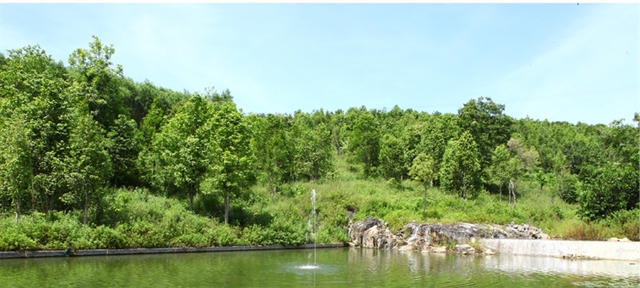 Sunday/Weekend
Sunday/Weekend

By Công Thành
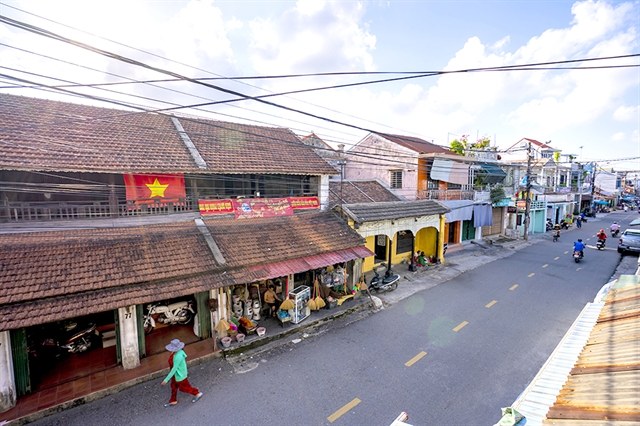 |
| The high street of Bao Vinh town in Thừa Thiên Huế. The 18th century port town still preserves lifestyle, culture and crafts from old time. Photo courtesy of Minh Kiệt |
Born and bred in Bao Vinh – an 18th-century port town just 8km east of Huế City – Phan Nữ Phước Hồng, a college lecturer, revived her childhood memories by regaining her ancestral house that had sheltered her three-generation family for 62 years.
Hồng, 45, sold her owned house in downtown Huế to rebuy the old house 16 years after it was sold to someone by her uncle.
"It was really a crazy idea to regain the old house with my own money," she said.
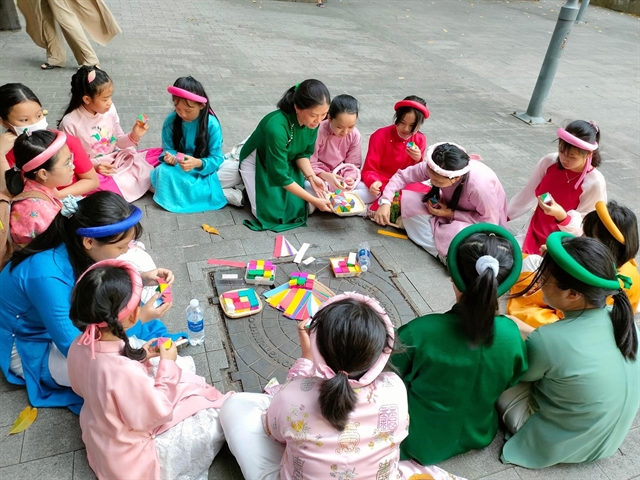 |
| PLAY TIME: Phan Nữ Phước Hồng introduces paper works for school students in Bao Vinh Town. Hồng opened the cafe to introduce local crafts. Photo courtesy of Phan Nữ Phước Hồng |
The Huế Teachers College lecturer said the old house, which was first bought by her grandparents in 1943, had accommodated the family until 2005 when her youngest uncle sold it.
“My grandparents, parents with uncles, had lived in the house since 1943. My youngest uncle inherited the house, but later he sold it,” she said.
“My parents bought a house in the ancient town to pay more regular visits to my grandparents in the old house in previous years.”
Bao Vinh Town, which stretches across a one-kilometre lane along the Hương River, previously had a river port for trading boats exchanging commodities with craft villages on the river banks in the 18th and 19th centuries.
“About 20 kiosks and piers were built for trade exchange among boat merchants and river-based communities. The town gathers craft villagers from Minh Hương, La Khê, Tiên Nộn, Sịa and Sình on both river banks and boat traders from different provinces,” Hồng said.
“Large vessels docked at Thanh Hà major port, while Bao Vinh handled smaller boats unloading rice, fuel, ceramics, silk and necessaries. Boats got craft products from villages for long-day trading journeys.
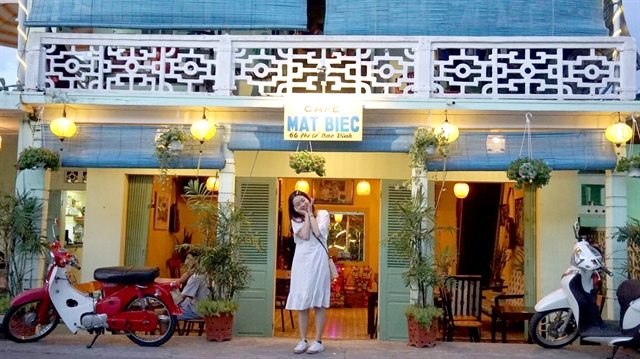 |
| STRIKING A POSE: A visitor at the café in Bao Vinh Street in Hương Trà Town, 8km east of Huế. Photo courtesy of the café |
“My grandmother was a rice trader on the Huế-Quảng Trị boat route, while my grandfather made Buddhist costumes. We enjoyed the well-off life of a trading family in the port town in my childhood.”
Hồng has redecorated the house as a café offering traditional crafts and promoting the traditional culture of the township. The café, named Mạ’s House, reminds her of the happiness that three generations of her family enjoyed together.
Part of her journey includes reviving old trades and crafts by introducing traditional cake-making skills at the café.
The cake, which is made from fruit jam and formed in a brass frame, was originally given as an offering to the royalty in previous centuries, according to Hồng’s mother, Tôn Nữ Minh Trang.
“I learnt housework and cuisine since I was a young girl, as in most families in Huế that educate girls in the household arts,” Trang said.
“Now I make the cake again for tourism business, but it is joyful to see the handicrafts being restored. Most of the elderly of the town are now 60 or 70, and enjoy the old style crafts that had been faded from the town for decades.”
Trang said the old locals liked to share stories about the old lifestyle of the town and introduce wickerwork, traditional cakes and other exquisite handiwork to tourists.
"Visitors pay from VNĐ40,000 to VNĐ80,000 each to learn cake-making with us, and they bring home their self-made cakes," she said.
The local market also offers a chance to explore crafts from the surrounding villages, including household ironwork, potteries, paper flowers, conical hats and wooden sculptures.
The business of the port faded in the 19th century when the Đông Ba Market was built under the reign of King Thành Thái.
Despite efforts to preserve the old wooden architecture of the Huế style, 75 per cent of old houses were ruined from 1991 to 2014.
Lê Quang Chất, the owner of a 100-year-old house, said it needed emergency restoration as the wooden structure had been seriously damaged due to time and flooding.
He said he refused to sell the wooden structure of the house for 12 taels of gold (worth US$24,000) to a collector.
 |
| SCENIC: A boat carries cargo and traders from craft villages to Bao Vinh Town. The town is a trade exchange site among craft villages and local communities. Photo courtesy of Phan Nữ Phước Hồng |
Chất said the family wanted to preserve the house for longer use, but the restoration needed money and old-style carpentry support.
The Thừa Thiên Huế province authorities had planned a restoration project for the township, but it has yet to come up with an action plan.
A report from Hương Trà Town’s authorities said that 10 one-storey roof-tiled houses, six timber structure houses and four French-style brick houses are still in good use in the town.
A boat tour connecting downtown Huế and the old township has been planned to expand tourism space and destinations outside the UNESCO-recognised Huế Monuments complex.
In promoting craft tours in the town, Hồng hosts cake-making trips for her college and school students as field education courses on culture and lifestyle.
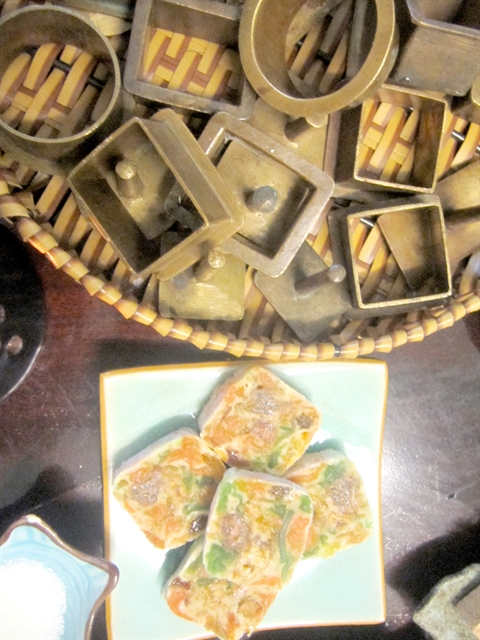 |
| TRADITIONAL SNACKS: Cakes and brass molds feature culture and the skilful craft of residents in Bao Vinh Town. VNS Photo Công Thành |
“I intentionally create a space for school students to explore tradition and culture by making cakes, trying knitting and folding paper. It inspires youngsters' love of culture and crafts. They will have an interesting time in the town with their parents at the weekend.” — VNS




